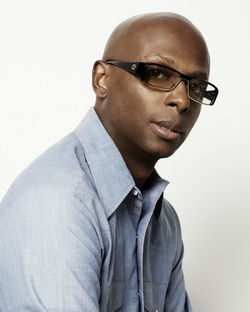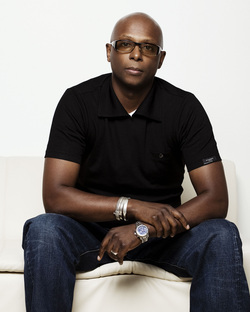Brit Pack Interviews
11/7/2012
DAVID MILLER

Name: David Miller
Profession: Vice President of International Marketing & Promotion at Altantic Records
Current Residence: Clinton Hills, Brooklyn
Previous residence: Wanstead, London, UK
Left UK in: 2002
David Miller is the epitome of a mover and shaker. He may not pop up on the red carpet often or appear in the celebrity blogs, but he’s the dude who’s been steadily developing some of the biggest urban acts into global superstars for the last 20 years.
First with his consultancy firm, Drum Media and then as a marketing exec for Sony/BMG in the UK.
His industry knowledge and branding expertise caught the attention of Mariah Carey and in 2002 he moved to the US to join her management team and spent two years working and touring with her before he was approached by Kevin Liles to join the Def Jam staff.
Three years later he followed the Def Jam executive team to Atlantic records and has been instrumental in developing the careers of artists like T.I, Jay-Z, Bruno Mars, Janelle Monae, Flo Rida, Trey Songz, Wiz Khalifa, Lupe Fiasco and many more.
When he’s not jetting globally between Europe, Asia and North America spearheading artist campaigns, or handling business at his new company Seven Grand Management he's keeping a close eye on his two daughters who are in a top New York city school.
BATP caught up with David in his office on the 28th floor of the Atlantic Records 6th avenue building:
Profession: Vice President of International Marketing & Promotion at Altantic Records
Current Residence: Clinton Hills, Brooklyn
Previous residence: Wanstead, London, UK
Left UK in: 2002
David Miller is the epitome of a mover and shaker. He may not pop up on the red carpet often or appear in the celebrity blogs, but he’s the dude who’s been steadily developing some of the biggest urban acts into global superstars for the last 20 years.
First with his consultancy firm, Drum Media and then as a marketing exec for Sony/BMG in the UK.
His industry knowledge and branding expertise caught the attention of Mariah Carey and in 2002 he moved to the US to join her management team and spent two years working and touring with her before he was approached by Kevin Liles to join the Def Jam staff.
Three years later he followed the Def Jam executive team to Atlantic records and has been instrumental in developing the careers of artists like T.I, Jay-Z, Bruno Mars, Janelle Monae, Flo Rida, Trey Songz, Wiz Khalifa, Lupe Fiasco and many more.
When he’s not jetting globally between Europe, Asia and North America spearheading artist campaigns, or handling business at his new company Seven Grand Management he's keeping a close eye on his two daughters who are in a top New York city school.
BATP caught up with David in his office on the 28th floor of the Atlantic Records 6th avenue building:
Why did you come to the US?
There aren’t many examples of successful black execs in the UK. There’s no real black middle class. The UK is a very restricted and institutionalized country and I think if you really want success and a career without worrying about being marginalized by prejudice then you have to be elsewhere. I developed my own business in the UK called Drum Media and built up a lot of good relationships in the States and I always thought about coming here to broaden my working career. My father has lived here for 30 years and my two sisters are here so I knew how life could be, how successful you can be and how open-minded the people are.
What was the hardest thing to overcome after moving here?
New York is a fantastic place to be but there’s a massive turnover of population each year. Very few people who work here are from here. People don’t come here to make friends, they come here to work. It’s very difficult to make friends. After the initial hype and excitement there comes a lull and you start to think about going home and you miss your family and your friendships. I had to get over that hump but I was mentally geared up to develop myself. It’s like you’re building your life again. You have to be mentally strong and have your eye on the prize.
There aren’t many examples of successful black execs in the UK. There’s no real black middle class. The UK is a very restricted and institutionalized country and I think if you really want success and a career without worrying about being marginalized by prejudice then you have to be elsewhere. I developed my own business in the UK called Drum Media and built up a lot of good relationships in the States and I always thought about coming here to broaden my working career. My father has lived here for 30 years and my two sisters are here so I knew how life could be, how successful you can be and how open-minded the people are.
What was the hardest thing to overcome after moving here?
New York is a fantastic place to be but there’s a massive turnover of population each year. Very few people who work here are from here. People don’t come here to make friends, they come here to work. It’s very difficult to make friends. After the initial hype and excitement there comes a lull and you start to think about going home and you miss your family and your friendships. I had to get over that hump but I was mentally geared up to develop myself. It’s like you’re building your life again. You have to be mentally strong and have your eye on the prize.

What are the main differences you found between Americans and Brits?
Americans are very insular. I remember sitting in a board meeting with Def Jam executives once and talking about the group 112. I wanted to confirm a promo date in the UK and one of the executives said ‘Can’t they do promo in the UK the day after they do the show in Japan?’ and I had to explain that Japan was in another continent and it doesn’t make sense to fly back to the UK for a day of interviews.
People ask you things like whether they can spend dollars in France or the UK and I have to ask them, can you spend Euros in America? They don’t relate at all, unless they have family in the UK or a West Indian background. Being black is not enough, people here are American first and I find they have a different view on life.
What’s your social life like?
By the time I came over here I wasn’t in the club, I wasn’t running around looking for friends so I think I moved at the right time. I love going to dinner and the movies and more mature forms of socializing. It took a few years to get into my stride. I love to travel and Miami and the Caribbean are just a couple of hours away.
What do you miss about the UK?
Nothing. I go back quite often, I’m there every other month but there’s nothing I miss. Life is so expensive there now. First-time buyers almost don’t exist anymore. We always had the opportunity to buy our own property and own a stake, that was almost a part of who the British were, but England is changing into a renting culture, like the States. You go shopping and you’ve only got to buy a few things and the price is frightening. I don’t hate the place; I just would never have been where I am in my career if I’d stayed there.
What have you learnt, if anything, about the American work ethic?
They like to work hard, long hours here. New York is a true reflection of diversity. People talk about diversity but New York is it. I’ve only got to walk down the hallway where I work and you see black, white, Asian and Jewish colleagues in every single department and that’s a reflection of New York City - you don’t get that everywhere. You walk into a blue chip company in the UK or a record label and there’s no black people. This is truly the land of opportunity.
What’s it like raising kids in New York?
It’s not the best but you’ve got to be 100% involved in everything they do. My kids are in a very good school; I'm blessed with a great family network too. My daughters go back to the UK during the school holidays and they love it. It’s how you mould them rather than allowing your environment to mould them for you.
For more information on David Miller and Seven Grand Management go to: www.sevengrandent.com
Americans are very insular. I remember sitting in a board meeting with Def Jam executives once and talking about the group 112. I wanted to confirm a promo date in the UK and one of the executives said ‘Can’t they do promo in the UK the day after they do the show in Japan?’ and I had to explain that Japan was in another continent and it doesn’t make sense to fly back to the UK for a day of interviews.
People ask you things like whether they can spend dollars in France or the UK and I have to ask them, can you spend Euros in America? They don’t relate at all, unless they have family in the UK or a West Indian background. Being black is not enough, people here are American first and I find they have a different view on life.
What’s your social life like?
By the time I came over here I wasn’t in the club, I wasn’t running around looking for friends so I think I moved at the right time. I love going to dinner and the movies and more mature forms of socializing. It took a few years to get into my stride. I love to travel and Miami and the Caribbean are just a couple of hours away.
What do you miss about the UK?
Nothing. I go back quite often, I’m there every other month but there’s nothing I miss. Life is so expensive there now. First-time buyers almost don’t exist anymore. We always had the opportunity to buy our own property and own a stake, that was almost a part of who the British were, but England is changing into a renting culture, like the States. You go shopping and you’ve only got to buy a few things and the price is frightening. I don’t hate the place; I just would never have been where I am in my career if I’d stayed there.
What have you learnt, if anything, about the American work ethic?
They like to work hard, long hours here. New York is a true reflection of diversity. People talk about diversity but New York is it. I’ve only got to walk down the hallway where I work and you see black, white, Asian and Jewish colleagues in every single department and that’s a reflection of New York City - you don’t get that everywhere. You walk into a blue chip company in the UK or a record label and there’s no black people. This is truly the land of opportunity.
What’s it like raising kids in New York?
It’s not the best but you’ve got to be 100% involved in everything they do. My kids are in a very good school; I'm blessed with a great family network too. My daughters go back to the UK during the school holidays and they love it. It’s how you mould them rather than allowing your environment to mould them for you.
For more information on David Miller and Seven Grand Management go to: www.sevengrandent.com

